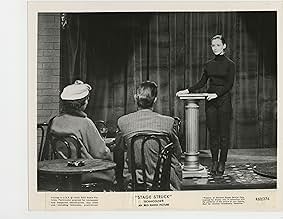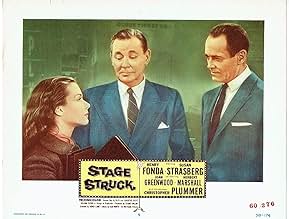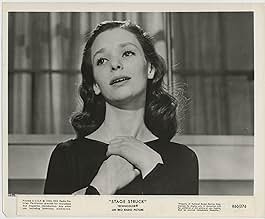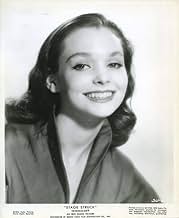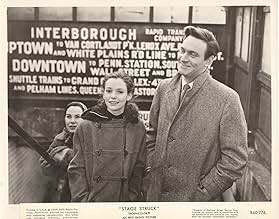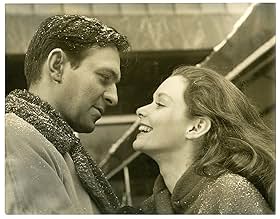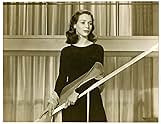AVALIAÇÃO DA IMDb
5,9/10
877
SUA AVALIAÇÃO
Uma jovem chega a Nova York determinada a tornar-se uma grande estrela teatral, mas descobre que seu objetivo pode não ser tão fácil de alcançar quanto ela esperava.Uma jovem chega a Nova York determinada a tornar-se uma grande estrela teatral, mas descobre que seu objetivo pode não ser tão fácil de alcançar quanto ela esperava.Uma jovem chega a Nova York determinada a tornar-se uma grande estrela teatral, mas descobre que seu objetivo pode não ser tão fácil de alcançar quanto ela esperava.
- Direção
- Roteiristas
- Artistas
Pat Harrington Sr.
- Benny
- (as Pat Harrington)
Pat Englund
- Gwen Hall
- (as Patricia Englund)
Merle A. Ashley
- Minor Role
- (não creditado)
Dario Barri
- Handsome Young Man
- (não creditado)
Rolly Bester
- Minor Role
- (não creditado)
Leon Bibb
- Guitar Player
- (não creditado)
- Direção
- Roteiristas
- Elenco e equipe completos
- Produção, bilheteria e muito mais no IMDbPro
Avaliações em destaque
Before this film, I had seen Susan Strasberg in two late 1960s AIP low-budget films 'The Trip' and 'Psych-Out' and enjoyed her performances in both so was quite interested in seeing her in the starring role here.
Alas, not only is she not up to the task, but she takes down the film with her. Her performance in the first 30 minutes or so is truly wretched; she's so strained and overwrought that it makes one cringe.
To be fair, from the time she does a reading from 'Romeo & Juliet' (which is quite charming) her performance settles down somewhat but the damage is done. After all, it's in the opening scenes where we're supposed to believe that she wins over Herbert Marshall as a close friend and enchants Plummer and Fonda but her performance kills any chance of that being convincing and the film never recovers.
However, the film is still fairly entertaining. While Fonda seems rather too genial to convince as a Broadway producer he's always entertaining to watch and helps hold the film together. And Joan Greenwood does a nice balancing act as she gives a melodramatic performance yet still lined with depth.
And, as other reviewers have mentioned, director Sidney Lumet puts in some nice touches with the detail he displays in the preparation that goes behind the scenes for opening night.
Also of interest is that it was released as an RKO picture and was probably close to the very last film released by that studio.
Alas, not only is she not up to the task, but she takes down the film with her. Her performance in the first 30 minutes or so is truly wretched; she's so strained and overwrought that it makes one cringe.
To be fair, from the time she does a reading from 'Romeo & Juliet' (which is quite charming) her performance settles down somewhat but the damage is done. After all, it's in the opening scenes where we're supposed to believe that she wins over Herbert Marshall as a close friend and enchants Plummer and Fonda but her performance kills any chance of that being convincing and the film never recovers.
However, the film is still fairly entertaining. While Fonda seems rather too genial to convince as a Broadway producer he's always entertaining to watch and helps hold the film together. And Joan Greenwood does a nice balancing act as she gives a melodramatic performance yet still lined with depth.
And, as other reviewers have mentioned, director Sidney Lumet puts in some nice touches with the detail he displays in the preparation that goes behind the scenes for opening night.
Also of interest is that it was released as an RKO picture and was probably close to the very last film released by that studio.
Although Susan Strassberg has been unfairly compared to Katharine Hepburn from the original Morning Glory, it's not quite a fair comparison. Forgetting that there is no one like Hepburn, Strassberg does do a decent job with the material given in Stage Struck. The problem is that the story has been changed and not for the better.
Romance was added to this production and it weakens the basic story of a young girl who is so single minded in her determination to be a success in the theater. The characters played by Adolphe Menjou and Douglas Fairbanks, Jr. in Morning Glory are now played by Henry Fonda and Christopher Plummer. The producer and the playwright now engage in a rivalry for Strassberg which weakens the story.
In the original Morning Glory it's made clear from the beginning that Menjou is a love 'em and leave 'em type and he's really got no interest in Hepburn in that direction as he sees she's not the type. Pipe smoking Fairbanks after Hepburn makes good would like to get something going with her, but she's into her art first and for always.
But Fonda and Plummer have a civilized rivalry for Strassberg and the story is which one will she choose. That I'm not telling.
Stage Struck has some nice location shots of New York in the late Fifties, Broadway and the Greenwich Village area and a bit of Park Avenue. Joan Greenwood is here as the star who falters and allows Strassberg her big break. Greenwood's quirky personality that British films utilized so well is strangely missing here. Herbert Marshall is great as the older actor that C. Aubrey Smith played in Morning Glory.
Stage Struck is a nice film, but definitely a come down from Morning Glory.
Romance was added to this production and it weakens the basic story of a young girl who is so single minded in her determination to be a success in the theater. The characters played by Adolphe Menjou and Douglas Fairbanks, Jr. in Morning Glory are now played by Henry Fonda and Christopher Plummer. The producer and the playwright now engage in a rivalry for Strassberg which weakens the story.
In the original Morning Glory it's made clear from the beginning that Menjou is a love 'em and leave 'em type and he's really got no interest in Hepburn in that direction as he sees she's not the type. Pipe smoking Fairbanks after Hepburn makes good would like to get something going with her, but she's into her art first and for always.
But Fonda and Plummer have a civilized rivalry for Strassberg and the story is which one will she choose. That I'm not telling.
Stage Struck has some nice location shots of New York in the late Fifties, Broadway and the Greenwich Village area and a bit of Park Avenue. Joan Greenwood is here as the star who falters and allows Strassberg her big break. Greenwood's quirky personality that British films utilized so well is strangely missing here. Herbert Marshall is great as the older actor that C. Aubrey Smith played in Morning Glory.
Stage Struck is a nice film, but definitely a come down from Morning Glory.
Some people are born with talent. Some can acquire it. Others can take all the lessons in the world, and still not grasp that elusive "it". And that's the problem with Susan Strasberg's performance: she clearly understands the nuances and subtleties of acting, but cannot connect that knowledge to the empathy and passion an actor must have to be believable in their role.
When at the party, Eva Lovelace recites the balcony scene from "Romeo & Juliet", and the guests become transfixed, I was never sure if they were staring in awe or horror. Strasberg pauses and reflects on her words perfectly -- at these moments, one could believe she's Juliet watching and waiting for her lover's answers. But when she recites the words -- and a recitation is all it is -- the fire, the passion of Juliet for Romeo is non-existent. She could just as easily have been telling the doorman to call her a cab.
The most interesting aspect of the film was in watching the various methods of acting being presented. Herbert Marshall (who started in silents and early talkies), Henry Fonda (who started in film in the 1930s) and Christopher Plummer (one of the new method actors) are all believable in their roles and mesh seamlessly together. Then there's Strasberg, who is incapable of presenting even a fraction of the range of any of her co-stars. (Frankly, I didn't make the connection between her and her father, and wondered who she knew to have secured the role.) The film is interesting as a curio piece, and Lumet's brilliance in portraying New York's scenery. But as a moving story about the theatre, it can't touch "All About Eve".
When at the party, Eva Lovelace recites the balcony scene from "Romeo & Juliet", and the guests become transfixed, I was never sure if they were staring in awe or horror. Strasberg pauses and reflects on her words perfectly -- at these moments, one could believe she's Juliet watching and waiting for her lover's answers. But when she recites the words -- and a recitation is all it is -- the fire, the passion of Juliet for Romeo is non-existent. She could just as easily have been telling the doorman to call her a cab.
The most interesting aspect of the film was in watching the various methods of acting being presented. Herbert Marshall (who started in silents and early talkies), Henry Fonda (who started in film in the 1930s) and Christopher Plummer (one of the new method actors) are all believable in their roles and mesh seamlessly together. Then there's Strasberg, who is incapable of presenting even a fraction of the range of any of her co-stars. (Frankly, I didn't make the connection between her and her father, and wondered who she knew to have secured the role.) The film is interesting as a curio piece, and Lumet's brilliance in portraying New York's scenery. But as a moving story about the theatre, it can't touch "All About Eve".
There is a strange artificiality to Susan Strasberg's performance which really throws this movie off kilter. Obviously she's playing a very theatrical young woman who lives for the stage, and in certain scenes (particularly the party scene where she is not only intoxicated from champagne but the dreamy proximity to so many Broadway celebrities) this technique is effective, but she never turns it off. In tender, heartfelt moments with Henry Fonda's seasoned producer and Christopher Plummer's blossoming playwright, both of whom are supposed to be madly in love with her, she's frightfully unresponsive. She's like a pretty little China Doll whose eyes can blink.
Nevertheless, there is much to like about this film. Fonda, Plummer and Herbert Marshall are superb as various incarnations of success who all become enchanted with Strasberg and her bewildering determination to be a star. They are all caught up in the complicated and decidedly unromantic machinery of the theatre world, and she represents the innocence they've either forgotten (Marshall), lost (Fonda), or are in jeopardy of losing (Plummer). (Although again, as Strasberg plays her, the innocence seems like a put-on, a florid, elaborate joke.) Part of the pleasure of the film is seeing Plummer in one of his very first, pre-"Sound of Music" roles. A darkly compelling leading man during this time with brooding traces of the new method acting style, he and the old school Fonda work well together - there's an interesting "passing the torch" dynamic there.
But the real reason to see this film is the stunning location photography of New York City. The director, Sidney Lumet, has always loved the city just as much as Woody Allen, and here it is practically the star. There is an exquisite scene in a snow blanketed park (Central?) that is as vivid as being there.
There is an added poignancy to this picture as Strasberg's part as an actress on the verge of "making it" was, I believe, intended to neatly dovetail with her own emerging stardom. A stardom that was, alas, to be short-lived.
Nevertheless, there is much to like about this film. Fonda, Plummer and Herbert Marshall are superb as various incarnations of success who all become enchanted with Strasberg and her bewildering determination to be a star. They are all caught up in the complicated and decidedly unromantic machinery of the theatre world, and she represents the innocence they've either forgotten (Marshall), lost (Fonda), or are in jeopardy of losing (Plummer). (Although again, as Strasberg plays her, the innocence seems like a put-on, a florid, elaborate joke.) Part of the pleasure of the film is seeing Plummer in one of his very first, pre-"Sound of Music" roles. A darkly compelling leading man during this time with brooding traces of the new method acting style, he and the old school Fonda work well together - there's an interesting "passing the torch" dynamic there.
But the real reason to see this film is the stunning location photography of New York City. The director, Sidney Lumet, has always loved the city just as much as Woody Allen, and here it is practically the star. There is an exquisite scene in a snow blanketed park (Central?) that is as vivid as being there.
There is an added poignancy to this picture as Strasberg's part as an actress on the verge of "making it" was, I believe, intended to neatly dovetail with her own emerging stardom. A stardom that was, alas, to be short-lived.
Strasberg gives what is perhaps one of the worst performances by an actress in an "A" film. Her acting is jaw-droppingly terrible, and "over-the-top" is too kind of a phrase. She obviously took her father's instruction to heart - he being Lee Strasberg of the Actor's Studio. The "waiting-for-the-reviews" party during the first thirty-minutes of the film actually contains a cring-worthy rendition of the famous balcony scene from "Romeo & Juliet."
Of course, director Lumet has a tendency to allow his performers to chew the scenery. Fonda is an exception, though. He provides his usual subdued interpretation. Plummer comes across quite nicely, as well.
However, the "romantic" conclusion is totally ridiculous, as there is zero chemistry between the characters who finally end up with one another.
I forced myself to watch this film till the end, but it wasn't easy. Not surprisingly, Strasberg's career eventually settled into "B" movies, and hammy TV roles.
Of course, director Lumet has a tendency to allow his performers to chew the scenery. Fonda is an exception, though. He provides his usual subdued interpretation. Plummer comes across quite nicely, as well.
However, the "romantic" conclusion is totally ridiculous, as there is zero chemistry between the characters who finally end up with one another.
I forced myself to watch this film till the end, but it wasn't easy. Not surprisingly, Strasberg's career eventually settled into "B" movies, and hammy TV roles.
Você sabia?
- CuriosidadesEva Lovelace (Susan Strasberg) is told to join the Actors Studio to learn her craft. In real life, Strasberg was the daughter of Lee Strasberg, the acting coach and director of the studio.
- Citações
Lewis Easton: [to Eva] You're a hungry little girl - the theater's offering you a feast.
- ConexõesFeatured in Hollywood the Golden Years: The RKO Story: Howard's Way (1987)
Principais escolhas
Faça login para avaliar e ver a lista de recomendações personalizadas
- How long is Stage Struck?Fornecido pela Alexa
Detalhes
- Data de lançamento
- País de origem
- Idioma
- Também conhecido como
- Stage Struck
- Locações de filme
- Empresas de produção
- Consulte mais créditos da empresa na IMDbPro
- Tempo de duração1 hora 35 minutos
- Cor
- Proporção
- 1.37 : 1
Contribua para esta página
Sugerir uma alteração ou adicionar conteúdo ausente

Principal brecha
By what name was Quando o Espetáculo Termina (1958) officially released in India in English?
Responda

